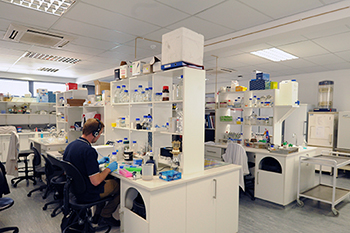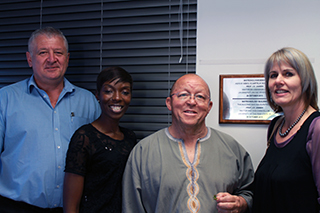Latest News Archive
Please select Category, Year, and then Month to display items
08 April 2021
|
Story Thabo Kessah
|
Photo UFS Photo Archive
 Dr KPD Maphalla with former UFS Chancellor, Dr Franklin Sonn, during the graduations in April 2007.
Dr KPD Maphalla with former UFS Chancellor, Dr Franklin Sonn, during the graduations in April 2007.
The University of the Free State is sad to learn of the passing of alumnus and award-winning Sesotho literary giant, Dr KPD Maphalla.
The literary works of Dr Khotso Pieter David Maphalla, like many other African writers and artists, were influenced and characterised by his own era of powerful forms of oppression and exclusion from dominant literary discourses. In his own right and through his writings of poetry, novels, short stories, and kodiamalla (dirge), he articulated a deliberate political and social protest and pushed for a place for African languages in literature at the height of apartheid.
“He entered the professional scene with his ground-breaking novel, Kabelwamanong, in 1982 at the age of 27. His career actually started in 1971 while he was still at school. Since his first novel, he has produced at least two books annually, covering the genres of poetry, novels, dramas, and short stories. As a dramatist, Dr Maphalla has written a number of excellent and educative radio dramas for the then Radio Sesotho (now Lesedi FM),” said his long-time friend and Head: African Languages at the University of the Free State, Dr Nyefolo Malete.
“It was for this writing prowess that he received recognition from the UFS when he was awarded an Honorary Doctorate in Literature by the Department of African Languages during a momentous ceremony on the Qwaqwa Campus in 2007,” added Dr Malete.
Dr Malete also revealed that, despite losing the use of his right hand after suffering a stroke following a car accident in the late 1990s, Dr Maphalla continued writing using his left hand. “He was adamant that, what he referred to as his ‘supposed disability’, would not deter his passion for writing.”
Dr Maphalla’s work has also produced numerous scholarly studies by the likes of Profs Moleleki Moleleki (protest poetry), Thapelo Selepe (lament and protest poetry), and Dr Seema Seema (process of cross-cultural communication). He was a committed Qwaqwa community member, who was also instrumental in the founding of Qwaqwa Community Radio (2000) and Metjodi Writers (2006), among others. He has written more than 70 books, many of which have been prescribed texts in schools.
Some of the awards he has won include:
South African Centre for Digital Language Resource (SADiLar) Sesotho Lexicographic Unit (Sesiu sa Sesotho) Lifetime Award for outstanding literary works and for promoting Sesotho literature (2019).
The Literature Festival and the University of the Free State Award for enormous contribution to Sesotho literature by a South African writer (2019).
Lifetime Achiever Award in Literature awarded by the Department of Arts and Culture (2005).
M-Net Book Prize for Sesotho poetry (2005). The first and thus far the only Sesotho author to have received this honour.
M-Net Book Prize for best novel (1996).
De Jager-HAUM Literary Award for his volume of short stories, Mohlomong Hosane (1993).
Thomas Mofolo Trophy for Best Novel, Best Poetry, and the Overall Award (1992).
Thomas Mofolo Trophy for Best Poetry (1991).
Dr JJ Moiloa Floating Trophy for Best Sesotho Poetry Book of the Year, Kgapa tsa ka (1985).
UFS launches expansions to Biotechnology Building
2015-11-04
 Biotechnology Building
Photo: Leonie Bolleurs |
To support the strategic focus of the University of the Free State (UFS) on teaching and learning in the field of Biotechnology, the Department of Microbial, Biochemical, and Food Biotechnology introduced upgrades and additions to the value of R23 million to the existing Biotechnology Building on its Bloemfontein Campus. The funding was provided by the Department of Higher Education and Training.
The new section, together with renovations to the existing part of the Biotechnology Building, was opened on Thursday 29 October 2015.
The Department, consisting of three disciplines - Microbiology, Biochemistry, and Food Biotechnology - is extremely diverse. Two of the three disciplines – Microbiology and Biochemistry – are housed in the Biotechnology Building.
Additions and renovations to the Biotechnology Building include:
- Four new research laboratories
- Nine revamped research laboratories
 At the launch of the Biotechnology Building were,
from the left: Nico Janse van Rensburg,
Senior Director: University Estates;
Maureen Khati, University Estates,
Prof Nicky Morgan, Vice Rector: Operations
and Ria Deysel, Director: Facilities Management.
Photo: Leonie Bolleurs
|
The work to the building will have dramatic effects on the quality, as well as the quantity, of postgraduate students. Given the national priority to deliver students, this is very important, particularly at the doctorate level.
Prof Koos Albertyn from the Department said these were the first renovations and expansions done to the building since 1 January 1990. “We welcome the extra space. Forty-six more postgraduate students can now be accommodated in the department,” he said.
Construction took place on the south-western corner of the existing building. Further developments to the building include:
- Six new offices
- A lecture hall for 70 students
- Laboratories that can accommodate 56 postgraduate students
Prof Martie Smit, Academic Head of the Department, said: “This new and refurbished facility enables us to give our best. As academics, we are committed to doing our part in delivering high-quality education at both undergraduate and postgraduate levels to students envisaging a future in biotechnology.”
The James Charles du Preez Seminar Room was also opened at the event. The seminar room is dedicated to Prof Du Preez – who was Head of the Department from October 2002 until the end of 2014. He played a major role in raising funds for upgrading the Biotechnology Building, including the addition of a new wing.